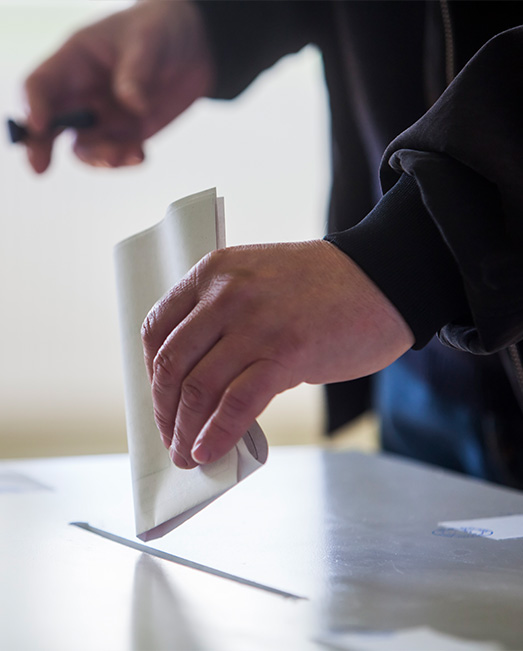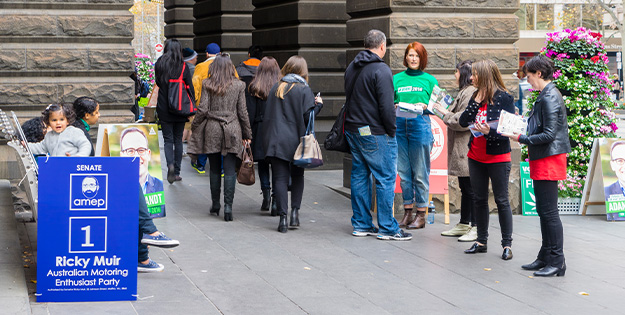Community
Copyright@ Australian Catholic University 1998-2026 | ABN 15 050 192 660 CRICOS registered provider: 00004G | PRV12008
Copyright@ Australian Catholic University 1998-2026 | ABN 15 050 192 660 CRICOS registered provider: 00004G | PRV12008

With a federal election looming, a landmark Australian study has discovered how our youngest voters decide who to vote for, and if they really care.
Many of us have been guilty of stereotyping an age group. There’s a good chance that at one time or another we’ve despaired about the ‘entitled’ Millennials, the ‘conservative’ Boomers, or the ‘cynical’ Gen Xers.
When it comes to politics perhaps we even assume that our youngest voters simply don’t care.
Our Lives, an Australian study led by ACU Deputy Vice-Chancellor (Education and Innovation) Zlatko Skrbis, shows the real story is much more complicated. Dr Jacqueline Laughland-Booÿ, an ACU research fellow with the study, interviewed Our Lives participants on their attitudes towards their first election and who they might vote for.
“The findings show that young people are not a homogenous group of disinterested and disengaged voters. Instead, there are varying levels of interest and effort being invested into electoral participation,” said Dr Laughland-Booÿ.
Through the research, Dr Laughland-Booÿ and the Our Lives team have identified five distinct voting strategies used by young people:
The impulsive voter is the most disconnected of young voters. They have no interest in politics, their vote is arbitrary and they put little or no effort into deciding who to support.
One respondent, Liam, said, “I’ll just close my eyes and I’ll tick a box.”
The study found that the main reason the impulsive group voted was because it was compulsory.
“People who are more aware of politics should be a bit more into the voting, whereas us, as in general, who aren't into it, our vote counts, but it's random,” said Liam. “That's not a good thing, because I really don't give a damn.”
The collective voter
While these voters respect the electoral process, they don’t feel they not know enough about politics to make a qualified choice.
“These voters follow the direction of others, particularly their parents who they believe are more knowledgeable about the current political debate,” says Dr Laughland-Booÿ.

Voters arrive at the last election
The instinctive voterThe instinctive voting strategy applies to young people who make decisions based on a ‘gut’ feel. They are usually not well versed in politics and may ‘vote for the face’; choosing one party over another because one leader seems ‘nice’ or the other ‘annoying’. Because their decisions are emotionally-based instinctive voters often found it hard to justify their vote when challenged.
The principled voter
These voters are more engaged in the electoral process. As a rule they are better informed about policies and candidates and they use their vote to assert their own ideals. Some have a political party they wish to support, while others focus on issues such as the environment or asylum seekers.
The pragmatic voter
This final group of voters use the most complex of strategies, weighing up multiple factors and priorities before arriving at their choice.
Pragmatic voter Matthew, describes himself as a swing voter. Before he votes he weighs up the competency of his local candidate and the party leaders, his beliefs regarding the capability of each party and his strength of feeling towards their policies.
Dr Laughland-Booÿ says, “Pragmatic voters are eager to receive and evaluate information presented to them during an election campaign. However, they accept that no one party will entirely reflect their own political views and they will have to make some compromises.”
Nothing to stereotype here
It seems our youngest voters are as diverse in their decision making as older, seasoned voters, busting the myth that Millennials simply don’t care. At least not all of them.
“It is very important to remember that young people are not a homogenous group. We must be very careful not to make generalisations about them,” says Dr Laughland-Booÿ.
That doesn’t, however, mean there is nothing to worry about. While we may find pragmatists, like Michael, who plan to get maximum benefit in return for their vote, we also have impulsive voters, such as Liam, who essentially throw their vote away.
“Young voters play an important role in determining who wins and who loses a federal election. It’s important that they are taught (in schools) the knowledge and skills they need to confidently participate in the electoral process,” she says.
As for whether these participants have changed their decision-making methods in time for the next election, time, and Our Lives, will tell.
Dr Jacqueline Laughland-Booÿ is a Research Fellow with the Office of the Deputy Vice-Chancellor (Education and Innovation) at Australian Catholic University.

Copyright@ Australian Catholic University 1998-2026 | ABN 15 050 192 660 CRICOS registered provider: 00004G | PRV12008